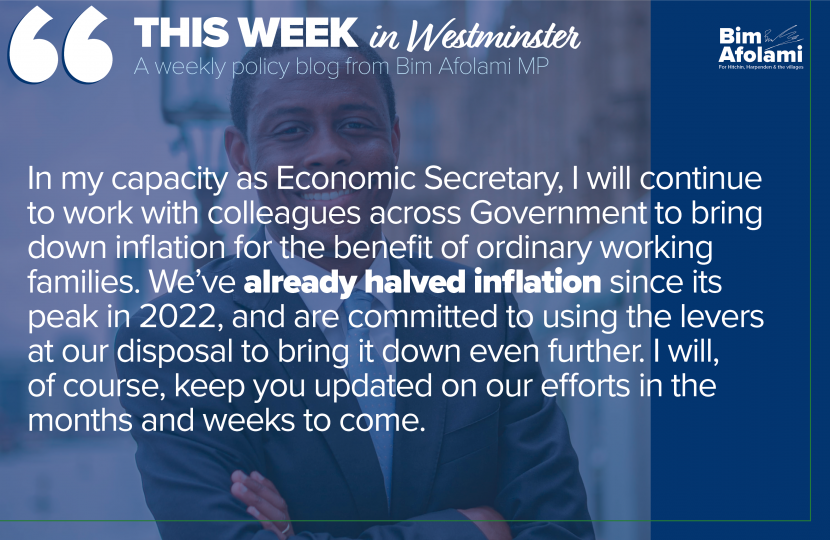
This week, inflation once again hit the headlines. As a result of the global economic shocks caused by Covid-19 and Putin's War in Ukraine, both of which caused huge disruption to global supply chains, we've been talking about inflation a lot more in the past few years - but what does it actually mean?
Put simply, inflation is the rate at which the price of goods is rising - that can be the result of higher costs for businesses which are then passed on to the consumer, or it can be the result of more money in the economy, which reduces the proportional value of each pound. In particular, we often focus on Consumer Price Index as a measure of inflation - that's a measure of inflation which specifically considers how rising prices effect the cost of essential goods.
As Economic Secretary to the Treasury, I'm working alongside the Chancellor of the Exchequer and the rest of the excellent Treasury team to bring down inflation, making your money go further, and making it easier to cope with the cost of living. It's worth remembering that interest rates, one of the main levers for addressing inflation, is under the control of the politically independent Bank of England - however, where we can make an impact, we're working to do so.
Part of that effort has been bringing down energy prices, which are one of the biggest costs facing businesses. To take a specific example, storing frozen food in fridges at the supermarket contributes towards the energy bill of supermarkets. As energy becomes more expensive, supermarkets might choose to put their prices up as a means of funding those rising energy bills. That's why we've been using both public and private sector levers to improve energy efficiency, and increase the amount of energy being produced here in the UK.
It's also why this Government has taken decisive action, in conjunction with our American allies, to protect shipping in the Red Sea from attacks by the Houthi rebel group. Many day-to-day consumer goods, particularly those originating in Asia, travel through the Red Sea, over the Suez Canal, and into Europe. Attacks on shipping in that part of the world result in higher costs for shipping companies, whether that's more money spent on private security, or greater expenses as a result of the decision to avoid the Red Sea altogether. In turn, these higher prices are passed on to consumers at the supermarket, making your weekly shop more expensive - that's why we've deployed the Royal Navy to the region, to help tackle the issue of Consumer Price Index at source.
In my capacity as Economic Secretary, I will continue to work with colleagues across Government to bring down inflation for the benefit of ordinary working families. We've already halved inflation since its peak in 2022, and are committed to using the levers at our disposal to bring it down even further. I will, of course, keep you updated on our efforts in the months and weeks to come.

